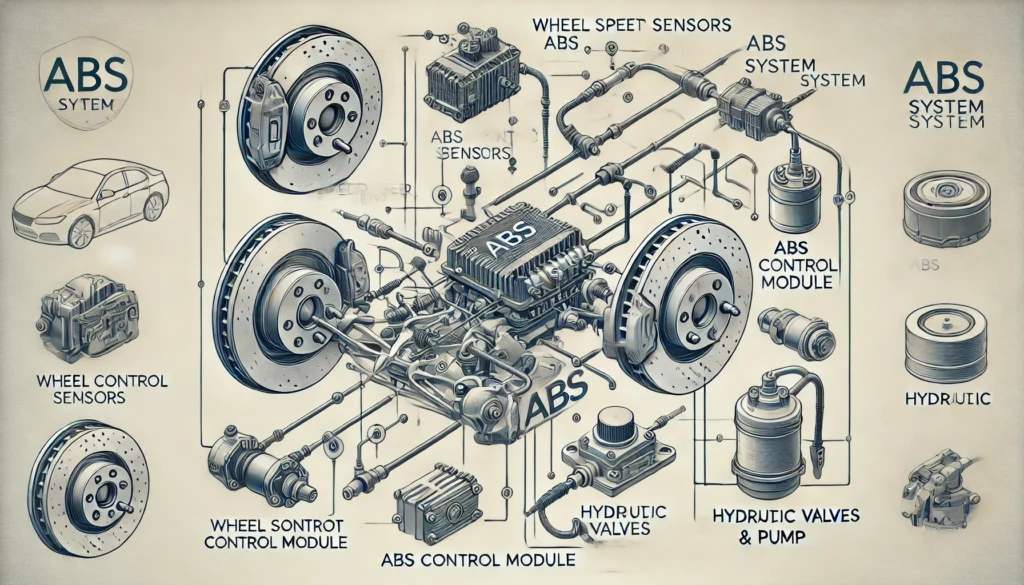The Anti-lock Braking System (ABS) is a vital safety feature in modern vehicles, designed to prevent the wheels from locking up during braking and maintaining steering control. When the ABS system malfunctions, it can raise concerns about vehicle safety and performance. One common question is whether an ABS fault can cause a failed emissions test. Understanding the relationship between ABS faults and emissions testing is essential for vehicle owners and can help clarify any confusion.
Understanding ABS and Its Function
The ABS system includes several key components:
- Wheel Speed Sensors: Monitor the speed of each wheel.
- ABS Control Module: Processes data from the wheel speed sensors and controls the hydraulic valves.
- Hydraulic Valves: Regulate brake pressure to prevent wheel lockup.
- Pump: Restores pressure to the hydraulic brakes after the valves release it.

Understanding Emissions Tests
Emissions tests are conducted to ensure that vehicles meet specific environmental standards for pollutants. These tests measure various emissions, including carbon monoxide (CO), hydrocarbons (HC), nitrogen oxides (NOx), and particulate matter. The goal is to reduce air pollution and ensure vehicles operate efficiently.
Impact of ABS Fault on Emissions Test
- No Direct Impact:
- Explanation: The ABS system and the emissions control systems operate independently. The ABS is specifically designed to manage braking performance, while emissions tests measure pollutants from the engine and exhaust systems.
- Scenario: An ABS fault does not directly affect the emissions produced by the engine. Therefore, it should not cause a vehicle to fail an emissions test.
- Indirect Impact Through Electrical Issues:
- Explanation: While an ABS fault does not directly influence emissions, underlying electrical issues causing ABS faults might potentially affect other systems, including those related to emissions.
- Scenario: A major electrical fault affecting the vehicle’s power supply could impact multiple systems, potentially leading to issues that might influence emissions testing.

- Associated Check Engine Light:
- Explanation: If the ABS fault is accompanied by a check engine light due to related issues, the check engine light could be a reason for failing an emissions test.
- Scenario: Emissions tests often fail vehicles with an active check engine light, as it indicates potential issues with the engine or emissions control systems.
- Sensor Malfunctions:
- Explanation: Sensors that affect both the ABS and emissions systems, such as wheel speed sensors, might indirectly influence emissions readings if they malfunction.
- Scenario: A faulty wheel speed sensor might affect vehicle performance, but this is unlikely to directly cause a failed emissions test.
Steps to Address ABS Faults and Emissions Concerns
- Diagnose the ABS Fault:
- Steps: Use an OBD-II scanner to read the error codes related to the ABS system. These codes help identify specific problems, such as a faulty sensor or a malfunctioning ABS control module.
- Importance: Accurate diagnosis is key to addressing ABS faults effectively and ensuring they do not contribute to broader vehicle issues.
- Inspect and Repair Electrical Connections:
- Steps: Check all electrical connections, including those related to the ABS and emissions systems, for signs of corrosion or looseness. Clean and secure any faulty connections.
- Importance: Ensuring good electrical connections can prevent multiple system faults and maintain overall vehicle performance.

- Maintain Regular Vehicle Inspections:
- Steps: Regularly inspect and maintain both the ABS and emissions systems as part of routine vehicle maintenance. Address any warning lights or error codes promptly.
- Importance: Regular maintenance helps prevent faults and ensures the vehicle operates efficiently and safely.
Conclusion
An ABS fault does not directly cause a failed emissions test, as the ABS and emissions systems operate independently. However, underlying electrical issues or sensor malfunctions could potentially impact both systems. Regular maintenance, accurate diagnosis, and prompt repairs are crucial for maintaining vehicle performance and ensuring success in emissions testing. Addressing any related check engine lights is also essential to prevent failed emissions tests.